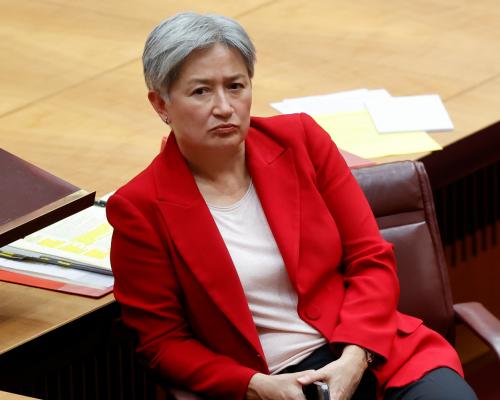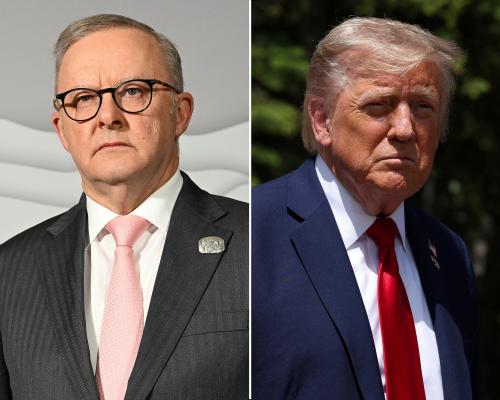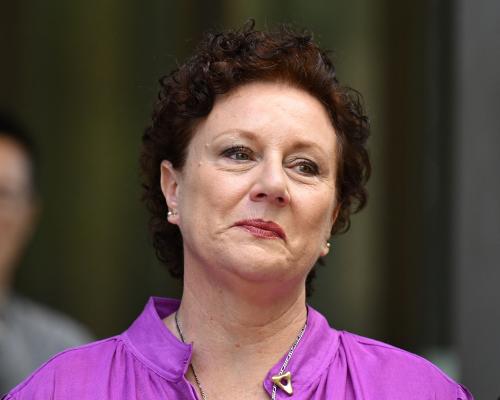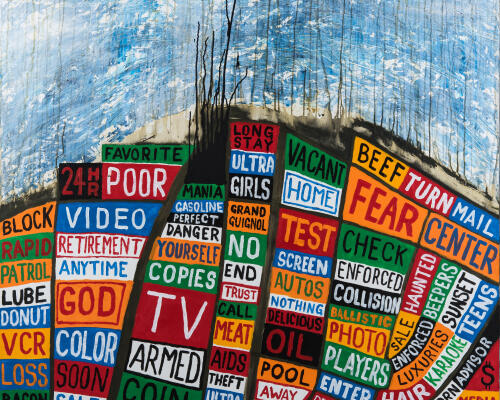
The foreign affairs minister, Penny Wong, directly complained about the targeted intimidation of exiled pro-democracy campaigners from Hong Kong to her Chinese counterpart, Wang Yi, during a bilateral meeting in Kuala Lumpur.
The July meeting was the first face-to-face discussion between the pair since two Hong Kong activists wanted for alleged national security crimes were subjected to anonymous letters offering Australian neighbours $203,000 to inform on them.
The letters are now being investigated by the countering foreign interference taskforce, which is led by Australia’s federal police and the domestic intelligence agency.
Government sources confirmed Wong privately reiterated her public criticism of the targeting of Adelaide-based Ted Hui and Melbourne-based Kevin Yam. Her office previously described their treatment as “reprehensible” and a threat to “our national sovereignty”.
While Australia’s consul-general in Hong Kong had previously raised concerns about the letters with local officials, Wong’s elevation of the issue during a meeting on the sidelines of the Asean summit has not been revealed until now.
Sign up: AU Breaking News email
Hui, an Australian resident and former Hong Kong politician, was also the subject of fake pamphlets that accused him of being a pro-Israel lawyer willing to “wage war” against Islamic terrorism. The letters were mailed to a mosque near his workplace and included his contact details.
Hui and Yam are wanted by Hong Kong authorities for allegedly breaching a controversial national security law that grants authorities sweeping extraterritorial powers to prosecute acts or comments made anywhere in the world that it deems criminal.
“We have consistently expressed our strong objections to China and Hong Kong on the broad and extraterritorial application of Hong Kong’s national security legislation and we will continue to do so,” said a spokesperson for Wong.
“Freedom of expression and assembly are essential to our democracy.”
The letters and pamphlets were mailed from Hong Kong or Macau, a special administrative region of China. Hong Kong authorities have denied sending the letters but this has not convinced the Australian government.
Yam, who has previously accused Hong Kong of interfering with his “fundamental freedoms and democratic rights as an Australian”, said he was grateful the minister had raised the issue with her Chinese counterpart.
“Transnational repression can be devastating in forms both brazen and subtle and I hope the government will take all these different forms with the utmost seriousness,” Yam said.
Hui, who was convicted in absentia for his role in pro-democracy protests during 2019, said Wong’s decision to raise the issue with Yi was “the right move”.
“Australians need to see that we’re not trading away everything just to restore economic ties,” Hui said.
In late July, Hong Kong also issued an arrest warrant for Australian pro-democracy campaigner Dr Feng Chongyi, who is a professor of China studies at the University of Technology Sydney.
Feng was one of 19 people accused of taking part in the unofficial Hong Kong Parliament, a pro-democracy organisation based in Toronto that Hong Kong authorities say is intended to subvert state power.
The group’s website states that “through democratic means, we are committed to safeguarding our community, defending the rule of law, and exposing the CCP’s system of governance for what it is: authoritarianism masked as legitimacy”.
Hong Kong authorities have placed a smaller $39,000 bounty on Feng for his involvement in the group. In 2017, he was detained for 10 days while on a research trip to China.
Speaking to the ABC in July, Feng described the arrest warrant as “political persecution and violation of basic human rights”.
Wong’s spokesperson said “Australia strongly objects to Hong Kong authorities issuing arrest warrants for pro-democracy advocates in Australia”.
China’s embassy in Australia was contacted for comment.
In July 2023, China’s foreign ministry spokesperson Mao Ning urged Australia, the UK and the US to stop sheltering activists subject to arrest warrants in Hong Kong.
“Relevant countries need to respect China’s sovereignty and the rule of law in Hong Kong, stop lending support for anti-China elements destabilising Hong Kong, and stop providing a safe haven for fugitives,” she said.





